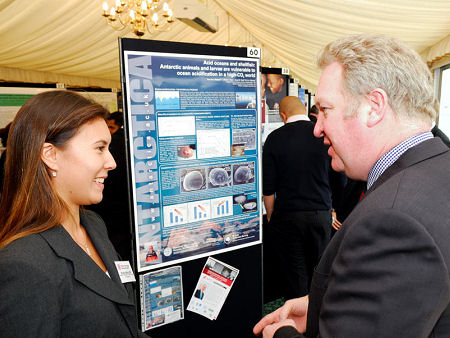Hemel Hempstead MP Mike Penning met with local research scientist Sue-Ann Watson at an exhibition at the House of Commons on Monday (9th March). Sue-Ann was displaying a poster she has designed for a national competition organised by SET for BRITAIN.
The SET for BRITAIN series of poster competitions is run by the Parliamentary and Scientific Committee to support and promote early-stage research scientists, engineers and technologists.
The competition was divided into three distinct areas: Biological and Biomedical Science, Physical Sciences and Engineering.
Sue-Ann, who is a PhD student at the National Oceanography Centre, University of Southampton was awarded a £1,000 prize as a runner-up in the Biosciences section. She is researching the effects of increased atmospheric carbon dioxide on the world's oceans. The oceans have absorbed around 40% of the carbon dioxide we have put in the atmosphere, but this carbon dioxide has made the oceans 30% more acidic than they were 200 years ago. This ocean acidification is detrimental to marine animals such as shellfish and corals.
Her poster was entitled: Acid oceans and shellfish: Antarctic animals and larvae are vulnerable to ocean acidification in a high-CO2 world.
After meeting Sue-Ann, Mike Penning said:
“I was pleased to have the opportunity to meet Sue-Ann at the House of Commons this week and am delighted that she was awarded a prize. It was very interesting talking to her about her work – particularly as one of my daughters is studying Marine Biology.
“I was very happy to hear that she was one of the runners-up in the competition and I congratulate her on that achievement.
“It is vital that we support the next generation of research scientists – they are the scientific leaders of the future. Early-stage researchers deserve particular encouragement and I welcome initiatives such as the SET for BRITAIN poster competitions in this respect.”
Sue-Ann says:
“I am delighted to have won a prize at such a prestigious event. It was a wonderful opportunity to talk to MPs about our science.
“Ocean acidity levels have been very stable for 23 million years. Our research shows that survival of young oysters will decrease by 43 to 72% by the year 2100 if we carry on emitting carbon dioxide at our current rate. Shellfish in the polar regions are also highly vulnerable to ocean acidification because more carbon dioxide is absorbed by cold waters.
“The oceans will still be safe for people to swim in, but delicate animals such as corals are unlikely to survive into the next century.
“The good news is it’s not too late to stop these effects on shellfish and corals; if we act now. We have the technology for both industries and individuals to reduce their power consumption and switch to renewable energy sources. Being ‘energy smart’ is the best thing we all can do to limit the effects of climate change.”
Photo: Mike Penning meets local research scientist Sue-Ann Watson who is researching the effects of increased atmospheric carbon dioxide on the world's oceans. Photo: Frank Dumbleton/SET for Britain.
